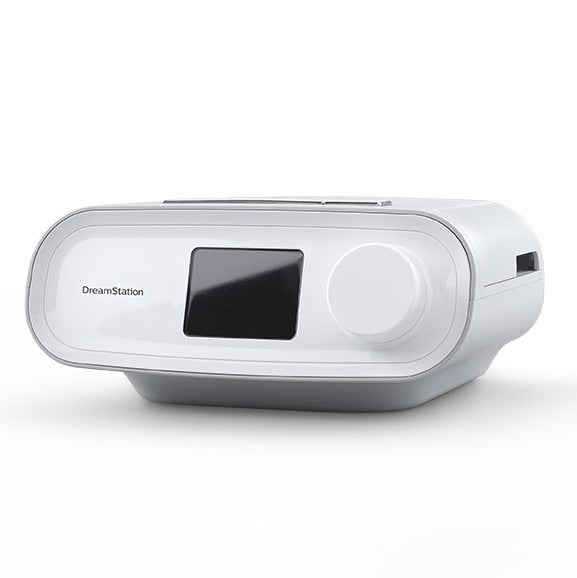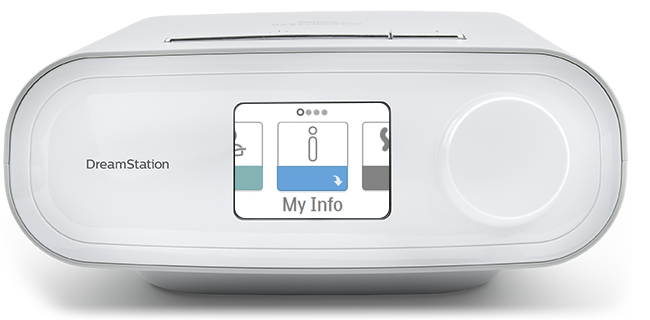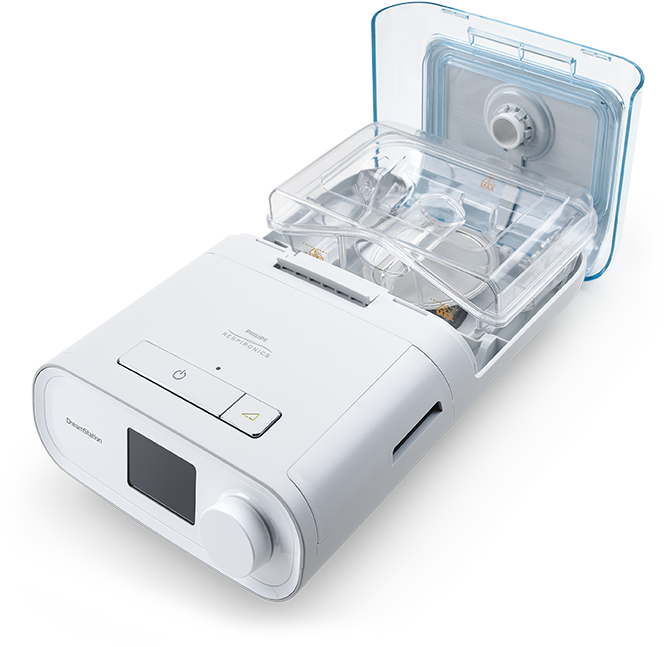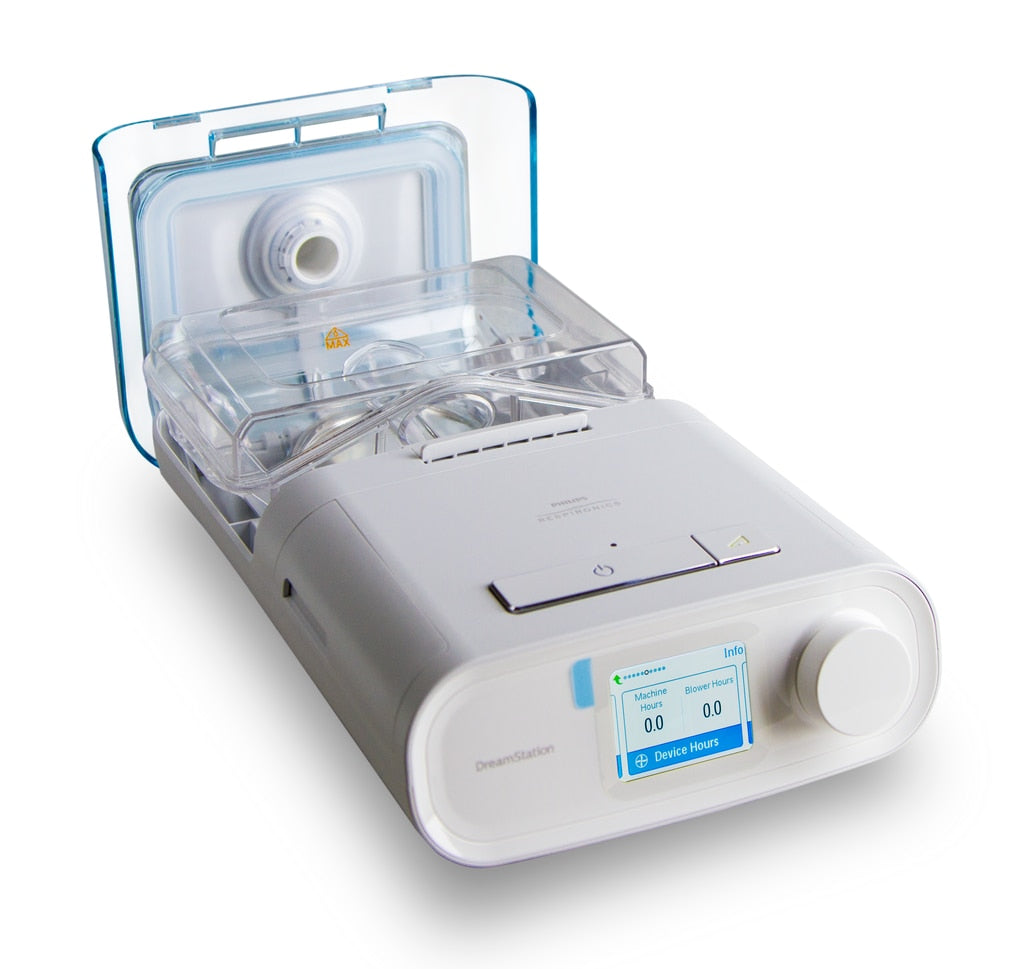Philips Respironics
Respironics DreamStation Auto CPAP w/ Standard Humidifer & Tubing DSX500H11
Respironics DreamStation Auto CPAP w/ Standard Humidifer & Tubing DSX500H11
SKU: DSX500H11
Couldn't load pickup availability
The Phillips Respironics DreamStation Auto CPAP Machine is a modern looking machine with many advanced features to increase therapy effectiveness and comfort. This is an auto-adjusting machine that automatically adjusts pressure during the night on a breath-by-breath basis to provide the optimum pressure needed.
Auto-Adjusting Pressure and Opti-Start Technology
The DreamStation Auto monitors the user throughout the night to provide pressures as needed when events occur. The machine remains at the lower pressure of the auto-adjusting range, and if an event is detected, increases pressure up to the upper pressure of the range to support the airway. With Opti-Start enabled, the machine begins therapy at 90% of the pressure reached in the previous session to help address residual events that may occur early in therapy.
A-Flex Pressure Relief
A-Flex helps mimic natural breathing patterns by lowering pressure during exhalation. The transition between inhalation and exhalation is also softened, making breathing more natural. As the machine adjusts pressure during the night, A-Flex also adjusts so that the desired amount of relief for exhalation is always given.

FEATURES:
SmartRamp Technology will increase pressure if an event occurs
Advanced Data Display
Mask Fit Check
Auto On/Off
Bluetooth Connectivity
Regular Alerts/ Reminders
Standard Humidifier
Standard Tubing
| SPECIFICATIONS: |
Weight:2.2 lb
Dimensions:6.18 L x 7.6 W x 3.3 H inches
With Humidifier: 11.7 L x 7.6 W x 3.3 H inches
Noise Level:Less than 30 db
Data Card:Yes
Software Available:Yes
Ramp:0-45 Min. with SmartRamp
Exhalation Relief:A-FLEX/C-FLEX
Pressure Range:4-20 cm/H2O
Altitude Adjustment:Automatic
Heated Humidifier:Available
Passover Cool Humidifier:Available
110 Voltage:Yes
220 Voltage:Yes
Can Use A Battery:Yes
Mask Off Alert:Yes
Warranty: 2 Years
| INCLUDES: |
DreamStation CPAP Machine
Standard Humidifier
Standard Tubing
Power Supply
Power Cord
Carrying Case
CPAP Hose
Reusable Blue Pollen Filter
User Manual
Recommended Replacement Schedule
| Full Face Mask | 1 every 3 months | The mask is the plastic portion of the interface. That part should be replaced every 3 months. The cushion part is different. The cushion inserts have to be replaced more often because of the contact with the face. They can be separated from the frame work and should be replaced once a month. |
| Nasal or Pillow Mask | 1 every 3 months | The mask is the plastic portion of the interface. That part should be replaced every 3 months. The cushion part is different. The cushion inserts or pillows have to be replaced more often because they touch the face. They can be separated from the frame work and should be replaced once a month. |
| Headgear | 1 every 6 months | CPAP mask headgear and chin straps may become stretched and lose their elasticity, leading to over-tightening and discomfort. They can also trap bacteria from sweat and moisture. |
| Tubing | 1 every 3 months | CPAP mask tubing may develop small holes or tears, which can cause air leaks. If your tube is leaking, you may not be receiving your prescribed therapy setting from your CPAP. This can cause you to feel like you’re not sleeping as well. |
| Chinstrap | 1 every 6 months | Chinstraps may become stretched and lose their elasticity, leading to over-tightening and discomfort. They can also trap bacteria from sweat and moisture. |
| Full Face Mask Cushion | 1 every month | Full face mask cushions cover more of your face and may deteriorate over time through regular wear and tear and cause leaks throughout treatment. Regular replacement is recommended for hygienic purposes and to ensure the best fit and most effective treatment. |
| Nasal Mask Cushion | 2 every month | Nasal mask cushions are in constant contact with your face and should be replaced consistently. Regular replacement is recommended for hygienic purposes and to ensure the best fit and most effective treatment. |
| Pillow Mask Pillows | 2 every month | Pillow masks are in constant contact with your face and the pillows sit inside your nose throughout the night. Regular replacement is recommended for hygienic purposes and to ensure the best fit and most effective treatment. |
| Heated Tubing | 1 every 3 months | CPAP mask tubing may develop small holes or tears, which can cause air leaks. If your tube is leaking, you may not be receiving your prescribed therapy setting from your CPAP. This can cause you to feel like you’re not sleeping as well. |
| Disposable Filters | 2 every month | CPAP device filters can wear out or become clogged over time, potentially exposing you to airborne particles, mold and bacteria. |
| Non-disposable Filters | 1 every 6 months | CPAP device filters can wear out or become clogged over time, potentially exposing you to airborne particles, mold and bacteria. |
| Humidifier Water Chamber | 1 every 6 months | CPAP humidifier water chambers may become discolored, cracked, cloudy or even pitted due to the mineral levels found in most tap and drinking water. As the material deteriorates, cracks may trap bacteria from moisture. |
| Mask Frame System | 1 every 3 months | The frame system is comprised of the mask frame and cushion. Due to being in close proximity to the face during treatment, frames should be regularly replaced. However, since not in direct contact, the frame system is only eligible for replacement every three months. |
| CPAP/BiPAP Machine | 1 every 5 years | A CPAP machine's life span is typically 5 years. We recommend getting a backup CPAP machine, especially if your current machine is more than two years old. That way you’ll never be without your therapy, even if one of your devices requires maintenance. |
Share








